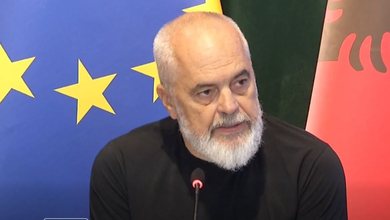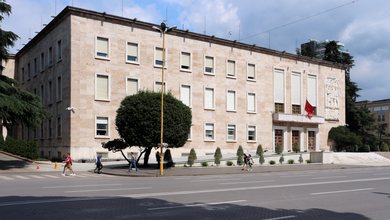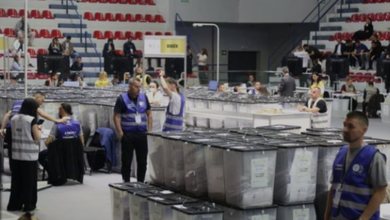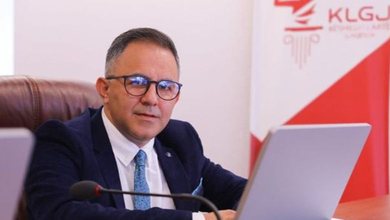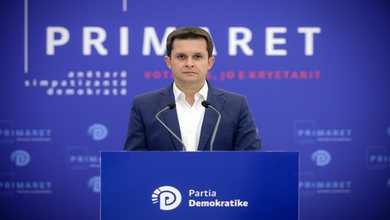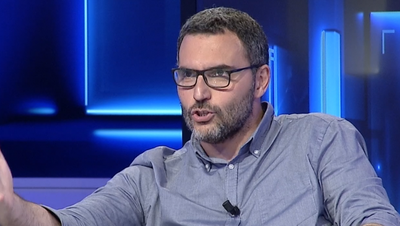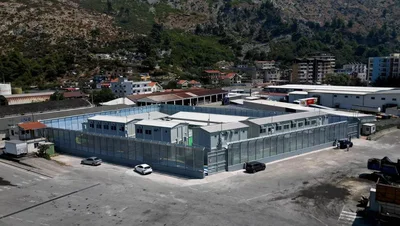
A temporary 3-year law, which aimed to promote investments in strategic sectors of the economy, for 10 years in a row appears to have been used to grant public property and building permits to a group of businessmen for the 'concreteization' of the coast.
At the end of May 2015, just two years after the Socialist Party came to power, 73 majority MPs gave the green light to the adoption of the law on "Strategic Investments", proposed by the government as an intervention with temporary effect until 2018, which would promote foreign and domestic investments in sectors with an impact on the country's economy.
The initiative provided for procedural, fiscal and administrative facilitations, public investments, the provision of public land and state intervention for the expropriation of private property, and other facilitations for those investors who would benefit from the status of "strategic investors".
Decision-making for these investments would fall into a few hands: the Investment Development Agency and the Strategic Investment Committee, which was headed by Prime Minister Edi Rama and comprised several ministers and the State Attorney.
The then Minister of Trade and Entrepreneurship, Arben Ahmetaj – today internationally wanted by SPAK for corruption and money laundering – defended the initiative as a way to accelerate and expand domestic and foreign investments by eliminating bureaucratic obstacles.
The government's report suggested that the law sought to promote investment in a short 3-year timeframe until a new comprehensive investment law was drafted, and that it targeted strategic sectors of the economy, mainly manufacturing - including energy, mining, agriculture and fishing.
In subsequent decisions of the Council of Ministers – adopted in implementation of this law – transport, infrastructure, electronic communications, urban waste, tourism, energy and mining were defined as strategic sectors.
Over the course of a decade, the majority postponed the law's implementation deadline five times. Meanwhile, the balance of supported projects shows that it failed to fulfill its stated goals – to attract foreign investment and promote investment in strategic sectors – serving, according to critics, only a small group of people to concrete the Albanian coast.
“The goal of attracting foreign investment is almost unrealized because we only have one foreign investment in car manufacturing and the second one was approved a few days ago, making this law end up being a law that has distributed favors to a group of businesses,” said Jorida Tabaku, a member of parliament from the opposition Democratic Party. “Also, strategic sectors such as agriculture and energy have been overlooked,” she added.
The government did not comment on the criticism of the strategic investment law. However, Eduard Shalsi, former Minister of State for the Protection of Entrepreneurship during 2019-2021 and a Socialist Party MP, defended the strategic investment scheme, emphasizing that it had brought benefits to the Albanian economy.
“Every law is measured by the effects it brings, and we have 5 billion euros of investments in a short period of time,” Shalsi said. “This has brought about sustainable economic growth,” he added.
'OK from above'
Of the 48 decisions approved so far, only two are foreign investments: a Korean investment for the production of car parts and an Arab one for the yacht port in Durres. Only two of the projects are investments in agriculture.
More than 80% of the decisions have favored investments in tourism, often in protected natural and archaeological areas, to build accommodation and hotel structures, where the beneficiaries turn out to be a group of businessmen connected to the government.
One of the beneficiaries of this law was Artan Gaçi, the husband of the socialist MP, Olta Xhaçka, who obtained the status to build a hotel on the coast of Drymades, one of the most beautiful areas in the south of the country, and was granted the right to use the seashore by government decision.
The case involved the Assembly and the Constitutional Court in an institutional conflict after the socialist majority refused to implement the decisions of this court to interpret the compatibility of Xhaçka's mandate, marking a negative record in meeting the criteria for democratic institutions in negotiations with the EU.
The law provides that AIDA must analyze in advance the investor's profile and request information regarding its financial capacity and ability to generate sufficient funds to finance the investment, financial statements, management structure, ownership, market positioning, previous experiences related to the investment field, similar projects, as well as other components necessary to prove its investment skills and potential to be a strategic investor.
But these procedures remain non-transparent, while in many cases, the strategic investment was previously promised by the prime minister and then the procedures were carried out, as in the case of Trump's son-in-law with Zvërnec or the Arab investment in the port of Durres.
But this path seems to have been followed in many other decisions as well.
A person close to the administrative procedures that AIDA follows to draft a file that is then signed by the Investment Committee told BIRN that "entrepreneurs came to us after receiving an 'OK from above'", meaning the prime minister.
Asking to remain anonymous, the same source claimed that the files often had major shortcomings, the companies were unable to justify with their balance sheets the financial guarantee required for the investments they claimed to make, but AIDA staff assisted them in 'forging' the papers.
The confidentiality of the process, approved by a decision of the Council of Ministers, prohibited AIDA from publishing the data and documents submitted by companies during the application phase.
Alienation of purpose
Legal and financial experts believe that the strategic investment law deviated from its primary goals of promoting the manufacturing and infrastructure sectors and that it did not contribute to promoting economic development, nor to tourism, the sector where it was most widely applied.
“It was conceived as a transitory instrument to encourage large capital (mainly foreign) in strategic productive and infrastructure sectors, but in practice it has served mainly as a means to accelerate and privilege investments of a limited developmental nature, focused on coastal tourism, mainly in real estate,” said Eduart Gjokutaj, founder of the financial education organization “Altax”.
Conducting an in-depth analysis of the 10-year balance of the law, Gjokutaj emphasizes that the fact that investments were focused on the tourism sector indicates a deep deviation from the primary goal: "stimulating investments in production and infrastructure", but also the institutional inability to assess the sustainability of investments.
"The process of evaluating applications for 'strategic investor' status has often been formal and not based on clear and verifiable criteria, and in many cases it has not been realistically assessed whether an investor is financially stable, whether he has relevant experience, or whether his goals are long-term and developmental," said Gjokutaj, adding that this has led to the selection of projects with low impact on the economy.
According to Gjokutaj, the effects of the law on the productive sectors – where its initial intervention was aimed – are minimal and negligible.
"From published data and reviews of concrete cases, approved investments in the energy, agriculture or transport sectors are either sporadic, or for the most part are unimplemented plans," he says.
Gjokutaj emphasizes that even investments in tourism have not been able to create a chain with the domestic manufacturing industry, but have brought about an "informal boom" focused solely on construction.
Daniel Prroni, a legal expert at the Institute for Democracy and Mediation, also describes the implementation of this law as focused on tourism and with minimal impact on other key sectors, such as agriculture or energy.
“This narrow approach has run counter to the original vision of comprehensive economic development,” he said, adding that “although the decisions taken may have formally respected the law, they have been contrary to the goals and effects that the law intended to achieve.”
Prroni also notes that the fact that most investments have gone to local beneficiaries in the tourism sector shows that "the law has been used more as a tool for preferential treatment than as a genuine instrument for strategic development."
Socialist MP Eduart Shalsi thinks differently, arguing that the law "is not discriminatory, whether you are foreign or local, but targets every investment."
While the fact that in 10 years its implementation gave priority only to tourism projects, for Shalsi it is related to the demand that the sector has had and the momentum of its development.
"We want to create the right environment to attract serious investors, and the right environment was created where sectors were developing," he said.
Referring to the lack of investment in agriculture, Shalsi suggests that the cause was the specific typology of this sector, where land is fragmented.
Clan capitalism
From the moment it was approved and the 5 times the deadline was extended – by decision of the socialist majority – the proponents of the legal change argued that the law on "strategic investments" was a transitional legal mechanism until the drafting of an integral law on investments, which has still not reached the Parliament after a decade.
The extension of the deadline was initially requested by the government in 2019 and then various names of socialist MPs were used to propose extending the deadline every year, with claims that it was helping the investment climate and that "the government would soon bring in the new law."
The latest postponement was approved earlier this year, extending its effects until December 2026, following a proposal by Socialist MP Pranvera Resulaj, which also foresees a new provision that paves the way for "strategic investors" in other sectors.
Its implementation, according to experts and the opposition, has brought to light major problems with properties, lack of competition, misuse of public resources in favor of strategic investors, conflict of interest in granting status, and lack of transparency in the way investors are selected - and on the other hand has not brought any impact on the economy or the tourism sector where it is focused.
"The main problem from the beginning was related to the property aspect, so I proposed an amendment to this article in 2015, but they did not take it into account," says MP Jorida Tabaku.
According to her, this article has created an anomaly because it allows the state to intervene between private relations, between the investor and the owner of the property.
"This violates the right of property, of the legitimate owner, to develop it," she emphasizes.
According to Tabaku, other problems brought about by its implementation are the preferential allocation of state assets without any competition and the approval of investments within Protected Areas.
Even financial expert Gjokutaj lists as one of the failures of the implementation of this law the political and local clientelism, which have justified the division of public property on the coast, where there has been "a deliberate concentration of 'strategic status'".
This mode of operation, according to him, has often been in open conflict with the public interest and legality.
Gjokutaj lists several reasons that, according to him, have brought more problems with the implementation of this law than the expected effects of its impact on the development of the domestic economy, starting from what he calls: the unclear liberalization of 'strategic tourism'.
“This definition has destroyed any differentiation between real investments with long-term impact and projects focused purely on the real estate market,” he emphasizes, while seeing the rush of domestic investors towards tourism associated with “much lower opportunity costs than agriculture, industry or energy.”
Gjokutaj also blames institutions for the lack of an inter-sectoral strategy, where strategic investments would be accompanied by coordinated policies in taxes, infrastructure, workforce or financial support.
"Without this coherence, the law has functioned in a vacuum, disconnected from developmental reality," he emphasizes, concluding that "this is a failure of a legal architecture that was not accompanied by institutional integrity, real selectivity, and a clear vision for long-term economic development."
For Daniel Prroni, the implementation of this law has raised serious concerns about fair competition, clientelism, violation of property rights and environmental damage - aspects that, according to him, conflict with EU competition standards or good practices in economic governance.
"The law grants non-competitive access to state assets by bypassing regular procurement procedures, and this penalizes businesses that follow the regular path and creates a perception, if not reality, of clientelism or 'crony' capitalism," he says, adding that in this way competition is distorted in favor of people with capital and political influence, not new actors with innovative potential.
In legal terms, according to Prroni, the law has serious impacts on property rights, by appropriating public property without competition and on the other hand by expropriating private property with the justification of "public interest", but in fact it serves private projects.
“Added to the slow and weak judicial system, a two-tier regime is created where strategic investors are protected, while local residents face uncertainty about their property rights,” he concluded.
Reporter.al


